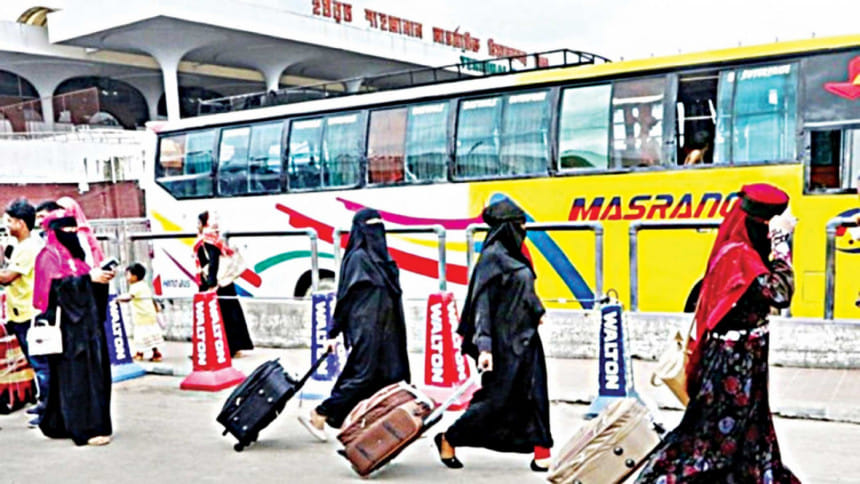Migration of Bangladeshi female workers to Saudi Arabia drops 35pc

The migration of Bangladeshi female workers to Saudi Arabia declined by 35 percent this year compared to the same period last year, according to data from the Bureau of Manpower, Employment and Training (BMET).
This drop, attributed to a lack of job demand from Saudi employers, contributed to an overall decrease in female migration from Bangladesh, as Saudi Arabia remains the largest job market for Bangladeshi female workers.
Only 26,834 female workers went to Saudi Arabia between January and September 2024, down from 41,327 workers during the same period last year, the data said.
Overall, 43,405 female workers migrated from Bangladesh in the first nine months of this year, a 28 percent decline from the 60,566 workers who left in the same period last year, it added.
Sector insiders point to a shift in employer preferences, with countries like the Philippines becoming more favoured due to their workers' skills and better English proficiency.
According to sector insiders, Bangladeshi female workers go to Saudi Arabia mostly as domestic workers and for such jobs they do not have to pay any migration cost since those are borne by the employers.
Fakhrul Islam, a recruiting agent and managing partner of Human Resource Development Center, said Saudi Arabia previously relied on Bangladeshi domestic workers but now has increased hiring options, including workers from the Philippines.
An official at the Bangladesh Embassy in Riyadh, preferring anonymity, said that Saudi Arabia has expanded its recruitment network, now sourcing workers from about 20 to 25 countries, up from just a few in 2015.
A Gulf News report on April 18 stated that Saudi Arabia has increased its hiring options to 33 countries, with recent additions such as Ethiopia, Burundi, Sierra Leone, Tanzania, and Gambia.
Shameem Ahmed Chowdhury Noman, former secretary general of the Bangladesh Association of International Recruiting Agencies, highlighted the need for modernising training facilities in Bangladesh to improve the skills of female migrant workers.
Shakirul Islam, chairperson of the Ovibashi Karmi Unnayan Program, warned that without adequate skills, Bangladeshi female workers could face future challenges in the Saudi market and may encounter exploitative situations.
Impact of lower employer costs
This recruitment decline coincided with a recent reduction in the costs Saudi employers pay for hiring Bangladeshi workers.
In January, the Saudi Ministry of Human Resources and Social Development capped the cost for recruiting domestic workers from Bangladesh at 11,750 Riyal, down from 13,000 Riyal.
Cost ceilings were also reduced for other source countries like the Philippines, Sri Lanka, Uganda, Kenya, and Ethiopia.
According to a recruiting agent, the cost reduction has posed challenges for Bangladeshi recruiters, as high intermediary and associated costs make the recruitment process more expensive.

 For all latest news, follow The Daily Star's Google News channel.
For all latest news, follow The Daily Star's Google News channel. 



Comments